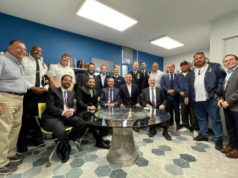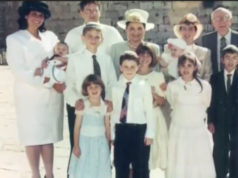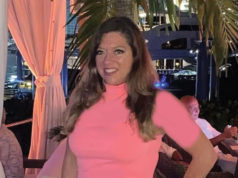
Many teenagers in our community are counselors at camp each summer, while others work in the city. This summer, I did something different. I spent 10 days in Israel on an advocacy program called Write On For Israel. (WOFI). WOFI is an intensive two-year program that trains high school students to become advocates for Israel through journalism. The program consists of seven Sunday seminars held at Columbia University that are taught by top educators and journalists along with appearances by PR executives, IDF officers and Israeli officials. Students participating in WOFI gain knowledge of ancient and current Israeli history as well as the confidence and skills needed to make Israel’s case on college campuses and in the world of media and politics. The summit of the program is the 10-day Israel mission that provides a hands-on look at Israel’s political and security issues.

This summer, the Write On class of 2010 visited army bases, museums, observation points, villages, and met with Israeli politicians, journalists and soldiers. This mission brought all that we had learned to life by giving us the visceral perspective we need to advocate on Israel’s behalf. Each day was given a title based on the theme of what our itinerary was focused on. What we witnessed and experienced in those 10 days and throughout our year in WOFI is vital for every Jew to see and feel in order to understand why we are here and what we need to do to help our brothers and sisters in Israel.

Our first stop after arriving at Ben Gurion Airport was at the Qalqilya-Kfar Saba Security Fence for a briefing. One of our leaders, Rabbi Yotav Eliach, explained that in the beginning, no one liked the idea of putting up a security fence, but it was necessary to protect neighboring cities from suicide bombers and snipers. We then boarded the bus, and on our way to the settlement/town Alfei Menashe, we were stopped at a checkpoint. Waiting at the checkpoint gave us a bitter taste of what life is like for the citizens of Israel. Even with vigorous security, everything needs to be double checked for the protection of the country. Everyday more and more checkpoints are being built to ensure as much safety as possible for the citizens of Israel.
Next, we visited an ancient synagogue from the 6th century. The floors of the synagogue were covered in beautiful mosaic images, both religious and secular. The artistry used in decorating the shul demonstrated how the Jewish people were immersed in their culture and the culture around them. But more importantly, the remains emphasized how far back Jewish presence has existed in Israel.

On our second day in Israel, we traveled to an IDF base. The IDF soldiers kept stressing that the goal of the army is not to kill or destroy; it is merely to dismantle the enemy’s ability to attack. The unbalanced representation of the IDF in the media may frustrate them at times, but it doesn’t distract them from their ultimate goal—to protect their beloved country.
Day three we drove to the community center in Iksal, an Israeli Arab village in the Galil where we met Mohammed Darwasha, head of the Abraham Fund. He described the goals of his organization—to establish positive relationships between Arab-Israelis and their Israeli neighbors.
The following day we went to the Museum of Israeli Military Intelligence in Herzliya for a guided tour of the Israeli Intelligence committee center and the Terror Exhibit. In the Terrorism Information Center we saw a room filled with all sorts of Palestinian propaganda, including posters praising suicide bombers and maps of the Middle East that don’t include Israel. The museum even had a display of actual rockets that have been fired at Israel within the past eight years. But the most chilling exhibit was a video of Palestinian children holding guns and chanting about becoming martyrs. We learned that the radicalism is programmed into the lives of Palestinian citizens, which makes the possibility of peace even harder.
That evening, Khaled Abu Toameh, journalist for the Jerusalem Post, and Yossi Klein Halevi, senior Israeli journalist, spoke about the possibility of peace between Israel and the Palestinians and about the issue of settlements. We were able to gain a journalists’ perspective of Middle Eastern politics. Both Toameh and Halevi explained that it’s necessary to separate yourself from the biases in order to be a fair reporter.
We spent part of erev Shabbat by the Kotel to pray mincha and arbit. The Write On group of 40 teenagers from all different backgrounds found themselves praying together in unison. Many of us cried from the overwhelming realization of what the Kotel means to the Jewish people.
On Sunday morning, David Horovitz, Editor of the Jerusalem Post, came to speak to us about the common misconceptions the general public has about Israel, and how unbalanced these assumptions are. He explained that there isn’t enough media coverage in the Middle East. Later, we went to an army base in Gush Etzion to meet an expert in the IDF’s purity of arms. He showed us a slide show titled Ethics in the Field, which showed how every decision made in the IDF is weighed carefully to make sure it’s a moral one, even when soldiers have a few seconds to react to a certain situation. Afterwards, we had a Q & A session with the Mayor of Efrat. And to finish the day off, we met with Neil Lazaros who taught us effective Israel advocacy. He corrected the mistakes we made, from our language to the tone in our voices and even to our posture and stance.
Monday morning began with a visit to the Israeli foreign ministry, where a senior legal advisor taught us the top 10 accusations against Israel and how to refute them. Then we boarded an armored bus and began our drive to Sderot, where we met Nurit Davida, an extraordinary woman who moved there to rebuild the spirit of the city with carnivals, community centers, playgrounds, etc. With the help of the local children, Nurit Davida has planned many events and programs to bring the smiles back to Sderot. The people living in Sderot learned Israel’s real strength is its unity. When we work together to fix the destruction and move past it, we become braver and stronger. As Nurit said: “The people living in Sderot are warriors.”
Our last day in Israel was the most emotional. First we went to the Yad Vashem Holocaust Memorial Center. The images and presentations were very graphic and disturbing, but they also ignited a spark of hope in all of us. After the destruction of the Holocaust we were able to bounce back and establish our own sovereign state.
Then we went to Har Hertzel, a military cemetery. Each tombstone is engraved with the soldier’s name, his parents’ names, and his age. Most of the ages were between 18 and 25, which sent chills down our spines. We were all very upset and emotional, but as we left we found ourselves inspired by the experience. If those brave men could risk their lives for us, we can do our share and help them in the fight for Israel’s safety and well-being. We might not be able to fight with our fists, but we can fight with our minds, we can fight with our hearts, we can fight with our words. Being at Har Hertzel helped us understand why our dedication to Israel’s case is so vital. We need our brave soldiers, but they need us as well. We were finally able to grasp why our advocacy is so important.
Throughout the trip, I made new friends and had great experiences, but more importantly I gained the strength and knowledge necessary to defend Israel. Being in Israel showed us what amazing things we have to preserve. Each of us returned home with a sense of maturity, pride, and ambition to achieve what we were trained to do. One can apply for the class of WOFI 2011 at www.writeonforisrael.org.
______________________
Rena Nasar is going to be a senior at Yeshivah of Flatbush High School. Her love of writing grows as she continues to express herself through her words. Rena wishes to study journalism in college.



